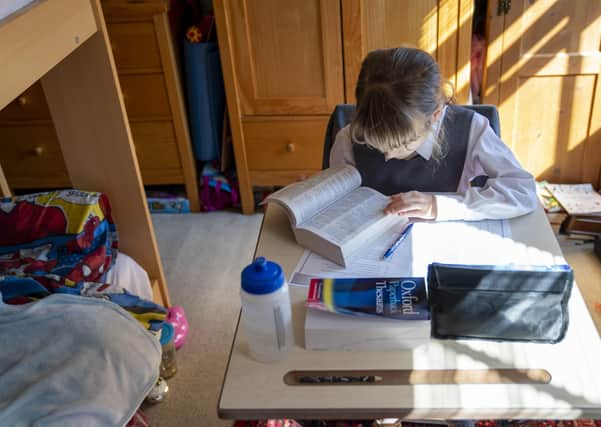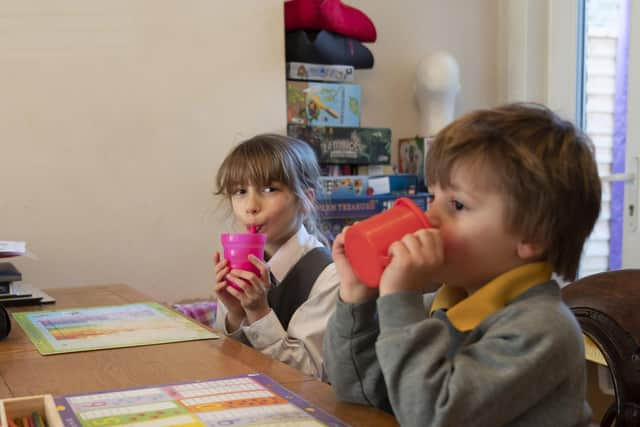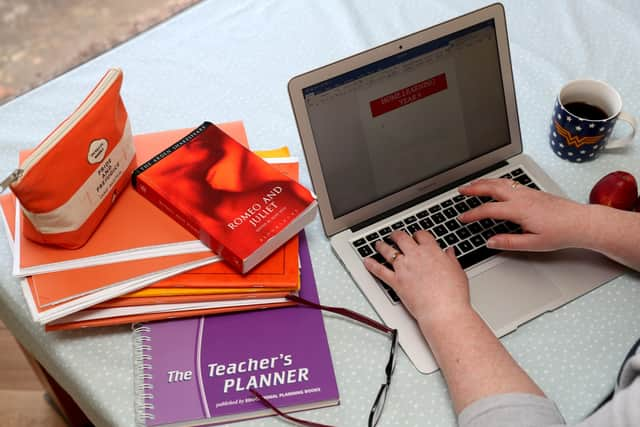Home schooling and a teacher’s top tips for parents – David Alcock


In my position as a teacher, outdoor educator, and father of two young children, here are some thoughts, starting with some guiding principles:
Work within the structure that your children’s school has put in place for remote working: Childhood learning is more effective in short bursts and when it is ‘interleaved’, i.e. when learners encounter different subjects and topics throughout the school day, week and term.


Advertisement
Hide AdAdvertisement
Hide AdBut be aware that in a school-based day, children ‘depressurise’ between lessons by chatting to their friends whilst they move around the school site; you could replicate this for secondary school students by allowing them short breaks between tasks to contact their friends and/or to move around.
Children thrive on variety: This might mean doing several activities in one day, interspersed by periods of playing, or engaging in online educational and not-so-educational video and gaming content.
Be flexible: Be willing to go off on a tangent if your child takes you on one!
Keep it simple: Let the imagination of younger children run wild with simple tools – see some ideas below.


Advertisement
Hide AdAdvertisement
Hide AdDon’t splash the cash: Just as there are more ways to skin a cat, there is more than one way to use a toy or another resource – indoors, outdoors, in the bath, repainted, recycled, and reused after a break.
Use technology judiciously: This is not only because most schools will be expecting your child to use it to work from home, but also because in place of face-to-face socialising in school, your children will justifiably want to use social media even more frequently than usual.
That’s all very well, but what about some practical ideas?
A garden will be a boon in these times, but some activities can be carried out in your once daily bout of family exercise. The increasingly clement weather and lighter days should facilitate this.
The summer term is when many schools run outdoor learning activities and field trips, and the shutdown means that children are in danger of missing out on these valuable opportunities. It is important to keep the outdoor flame burning – in all its inquisitive, resilience-building, messy, muddy, invigorating glory.
Advertisement
Hide AdAdvertisement
Hide AdThere are many outdoor learning ideas in the Outdoor Classroom Day website, but some of the simplest ideas for the youngest children in your household involve art. Paintbrushes dipped in water provide a surprisingly entertaining distraction and investing in jumbo chalk sticks gives children free rein over your patio and walls!
Easy activities, like gardening, can be tailored into learning opportunities. These include the building of a ‘bug hotel’, and planting bulbs and vegetables. The RSPB has many great ideas on their website. Building hides and camping in the garden will occupy several hours. For older children, why not inspire them into producing outdoor artworks with natural materials, in the style of Andy Goldsworthy?
Children in Key Stages 1-3 may like to undertake many of the zany activities developed by the Mission:Explore collective. Some of their ideas are available for free online, and their books are also available. The Scout Association – experts at outdoor learning – has a fantastic website.
Walking in the local park or woods, while, of course, conforming to Covid-19 social distancing rules, may be enough to stimulate your children – and those of any age will need little prompting to make dens or dam brooks. It has been proven that spending time in green spaces – and especially forests – is great for mental health.
Advertisement
Hide AdAdvertisement
Hide AdMuch of the day will, however, either by choice or necessity, be spent indoors. Simple pleasures such as reading, practising a musical instrument, or jigsaws, will undoubtedly see a rise in popularity. The art of letter-writing, perhaps to an elderly relative, may make a comeback. There should be more time for meal preparation: younger children will find it fun, and older children could also benefit as part of their move towards independence.
Children may want to pick up a new skill, such as juggling or sudoku, and for those looking to model real-world phenomena and processes, I recommend a web search for ‘kitchen geography’ and ‘kitchen science’. Finally, there are over a 100 ideas about what to do in The Great Indoors on the website of the Scouts. Good luck!
David Alcock teaches geography at Bradford Grammar School and blogs at www.alcock.blog.
Comment Guidelines
National World encourages reader discussion on our stories. User feedback, insights and back-and-forth exchanges add a rich layer of context to reporting. Please review our Community Guidelines before commenting.
